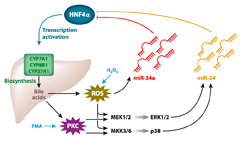- Home
- Highlights
- Toxic responses: a big role for micro RNAs
Highlights
Toxic responses: a big role for micro RNAs
The regulation of gene expression for a range of processes relies on micro RNAs. These small non-coding RNAs, 21–23 nucleotides in length, influence cell development, differentiation, and signalling, as well as disease development and drug and immune responses. Now Tsuyoshi Yokoi and Miki Nakajima at Kanazawa University in Japan provide an overview of the current knowledge of miRNAs, how they can be harnessed for use as indicators of biological conditions and their role in treatments.
Micro RNAs regulate gene expression at the stage between transcription, where a segment of DNA is copied into RNA, and translation, where messenger RNA (mRNA) is decoded to produce an amino acid chain that will later fold into an active protein. They bind to untranslated regions of messenger RNA and coding sequences, inhibiting translation or mRNA degradation. The role of micro RNAs in the development of cancer has been extensively studied. However, as Yokoi and Nakjima point out, recent work has underlined the broader potential of micro-RNA-related research.
The cytochrome P450 family are a group of enzymes that are central to the metabolism of drugs. A number of these enzymes are regulated postranscriptionally by micro RNAs and the authors describe a variety of examples. They also show examples of how micro RNAs influence toxic responses. The complexity of the regulatory networks between micro RNAs and targets and the potential differences in responses in vitro and in vivo introduce substantial challenges. Yet the authors point to a range of promising studies from in vitro and in vivo investigations to high-throughput profiling of miRNA expression. As they explain, “miRNAs will contribute to the comprehensive understanding of drug or chemical-induced toxicity, which will facilitate drug development and clinical pharmacotherapy.”
Publication and Affiliation
Tsuyoshi Yokoi and Miki Nakajima microRNAs as mediators of drug toxicity. Annual Review of Pharmacology and Toxicology. 53, 19.1–19.24 (2013).
Link
Department of Drug Metabolism and Toxicology, Faculty of Pharmaceutical Sciences, Kanazawa University, Kanazawa 920-1192, Japan
corresponding author, e-mail address: tyokoi@p.kanazawa-u.ac.jp or nmiki@p.kanazawa-u.ac.jp
ID: 201302H020

